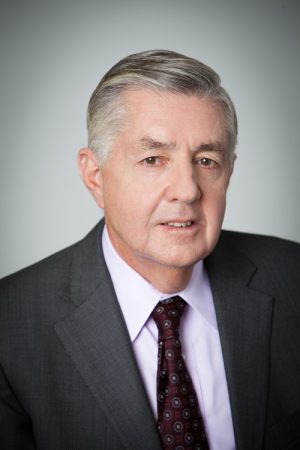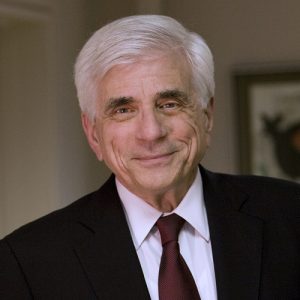A Legendary Litigator Jumps From Biglaw To Boutique
He's joining Berg & Androphy after more than forty years at Weil Gotshal.

James Quinn
Where do you go after spending more than four decades at one of the world’s leading law firms? The golf course might be the answer for many — but not for James W. Quinn, who left Weil Gotshal & Manges to join the New York office of one of the nation’s top litigation boutiques, Berg & Androphy.
During his time at Weil, Jim Quinn handled some of the firm’s biggest cases, including a number of headline-making sports law matters. He also served in firm leadership, as longtime head of the litigation department and as a member of the management committee. At Berg & Androphy, which he joins as of counsel, Quinn will continue to try cases and also expand his mediation practice.

Is The Future Of Law Distributed? Lessons From The Tech Adoption Curve
If you spend even a small amount of time with Jim Quinn and David Berg, founding partner of Berg & Androphy and a top trial lawyer himself, you’ll be struck by their easy rapport. They finish each other’s sentences, interrupt one another frequently (without getting on each other’s nerves), and generate lots of laughs. You’d think they had been partners for decades.
And in a sense they have. They first worked together in the mid-1990s, defending Westinghouse Electric Corp. at trial against allegations that it provided a nuclear power plant in Texas with faulty generators that were leaking radioactive material.
Working as co-counsel doesn’t always generate close ties, but it’s more likely to when you spend as much time together as Quinn and Berg did. “There’s no bonding experience like a jury trial,” as Berg told Gabe Friedman of Big Law Business — and that’s especially true when the trial lasts for six months and takes place in Bay City, a tiny town in southeast Texas.
After that matter ended successfully, Quinn and Berg stayed in touch, both personally and professionally. As Berg mentioned to Brian Baxter of Am Law Daily, Quinn would sometimes refer work that he couldn’t handle at Weil because of conflicts — including one case in which Berg obtained a $420 million settlement from Marriott.
Sponsored

The Business Case For AI At Your Law Firm


Early Adopters Of Legal AI Gaining Competitive Edge In Marketplace

Navigating Financial Success by Avoiding Common Pitfalls and Maximizing Firm Performance

Legal AI: 3 Steps Law Firms Should Take Now

David Berg
A few years ago, Berg started to spend more time in New York City, mainly for personal reasons. In July 2015, Berg & Androphy launched a New York office, led by former Kasowitz Benson partners Michael Fay and Jenny Kim. In the middle of last year, Quinn and Berg started exploring the possibility of Quinn coming on board.
Now it’s official — and it makes perfect sense. Although Quinn has been recognized as a “legendary litigator” by the Legal 500, the “L word” doesn’t do him justice; he is a true trial lawyer, one who brings cases before juries — and wins. So he’s a great fit at Berg & Androphy, a firm full of seasoned trial lawyers — including David Berg himself, described by one former general counsel as “the St. Jude for bet-the-company cases.”
Berg and Quinn hope to try cases together once again, although they recognize that the litigation environment isn’t what it was back in the 1990s. The major change: many fewer cases go to jury trial. About 1 percent of federal cases reach a jury today, compared to more than 10 percent back in 1962.
I spoke with Berg and Quinn by phone earlier today — while Quinn was on break from a mediation, showing that he’s not missing a beat as he transitions from firm to firm — and I asked them: what’s behind this trend of the vanishing jury trial, and what can be done about it?
Sponsored

Is The Future Of Law Distributed? Lessons From The Tech Adoption Curve

Legal AI: 3 Steps Law Firms Should Take Now
“One of the main causes is that folks have gotten more risk-averse, especially when it comes to going to trial before a jury,” Quinn said. “It’s due in large part to the enormously increased cost of going to trial, especially in large commercial cases. I personally think it’s unfortunate. As for the likelihood that it can be reversed, I’d love to see that, but I’m not confident it can be.”
Some of the fault for the decline of trials can be assigned to the U.S. Supreme Court, Berg said. In a series of cases, covering such subjects as pleading requirements, the standards for granting summary judgment, and alternative dispute resolution (especially arbitration), the Court “has created procedural hurdles that do an end run around the Seventh Amendment right to a civil jury.”
Another culprit, according to Berg: the Chicago school of law and economics and one of its leaders, legal academic turned Seventh Circuit judge Richard Posner. Although Posner is “so smart and funny, I kind of hate him,” the economic analysis of law that he pioneered “has really undermined the law, especially for the little guy.”
The declining number of jury trials led us naturally to chat about alternative dispute resolution — particularly mediation, which Jim Quinn will focus on at Berg & Androphy. He couldn’t resist referring me to the website for his mediation practice, JW Quinn ADR LLC (which led Berg to humorously mutter, “Just stand outside in a sandwich board!”).
“One of the reasons I started my mediation practice is that so many of these major commercial cases are being mediated,” Quinn explained. “Mediation doesn’t always lead to settlement, but there’s almost always going to be a mediation, sometimes as a matter of course. As a result of mediation and other forms of ADR, there are fewer and fewer cases available to go to trial.”
A desire to grow his mediation practice was a big part of Quinn’s decision to leave Weil for Berg & Androphy. As he explained to both Am Law and Big Law Business, working at a Biglaw firm like Weil Gotshal, while wonderful in many ways, can create a perception of being too closely tied to large corporate clients. Because one key to being a successful mediator is getting the parties to trust you early on, such perceptions, even if inaccurate, can be limiting.
James Quinn is far from the only prominent lawyer to leave a Biglaw firm for a boutique. I asked him for his outlook on the future of Biglaw. Does he buy into the predictions of doom, or at least those of a massive winnowing of hundreds of firms down into dozens?
“There will be some winnowing in the middle ranges,” Quinn said, “but Weil and the established firms will continue to thrive. They have the ability to bring together a huge amount of legal firepower, not just in litigation but also in various types of corporate law, which large companies will continue to want for the things that really matter — the biggest deals and litigations.”
Of course, Jim Quinn cautioned, some Biglaw firms have true trial lawyers, and some do not. If you are a client looking for a firm to represent you in a matter that might go to trial, you need to make sure that the firm has true trial expertise — like Berg & Androphy.
“Jim and I look forward to trying some cases together,” David Berg said. “We did very well the first time, and I suspect we’ll do fine in the future. What made this happen is that we have a great deal of respect for each other’s trial skills. In fact, I think Jim worships me.”
“As far as our trial skills go, David’s great,” Quinn said. “But I’m greater.”
Spoken like true trial lawyers. Best of luck to James Quinn and David Berg as they enter the newest chapter of their long and illustrious careers.
No Retirement: 71-Year-Old Lawyer Leaving Weil, Wants More Trials [Big Law Business]
Two Top Sports Lawyers—On Opposite Sides—Switch Firms [Am Law Daily]
Renowned Trial Lawyer James Quinn Joins Berg & Androphy in New York [PR Newswire (press release)]
Earlier: 5 Litigation Lessons From Joe Jamail’s Trial Strategy In Pennzoil v. Texaco
 David Lat is the founder and managing editor of Above the Law and the author of Supreme Ambitions: A Novel. He previously worked as a federal prosecutor in Newark, New Jersey; a litigation associate at Wachtell, Lipton, Rosen & Katz; and a law clerk to Judge Diarmuid F. O’Scannlain of the U.S. Court of Appeals for the Ninth Circuit. You can connect with David on Twitter (@DavidLat), LinkedIn, and Facebook, and you can reach him by email at dlat@abovethelaw.com.
David Lat is the founder and managing editor of Above the Law and the author of Supreme Ambitions: A Novel. He previously worked as a federal prosecutor in Newark, New Jersey; a litigation associate at Wachtell, Lipton, Rosen & Katz; and a law clerk to Judge Diarmuid F. O’Scannlain of the U.S. Court of Appeals for the Ninth Circuit. You can connect with David on Twitter (@DavidLat), LinkedIn, and Facebook, and you can reach him by email at dlat@abovethelaw.com.







